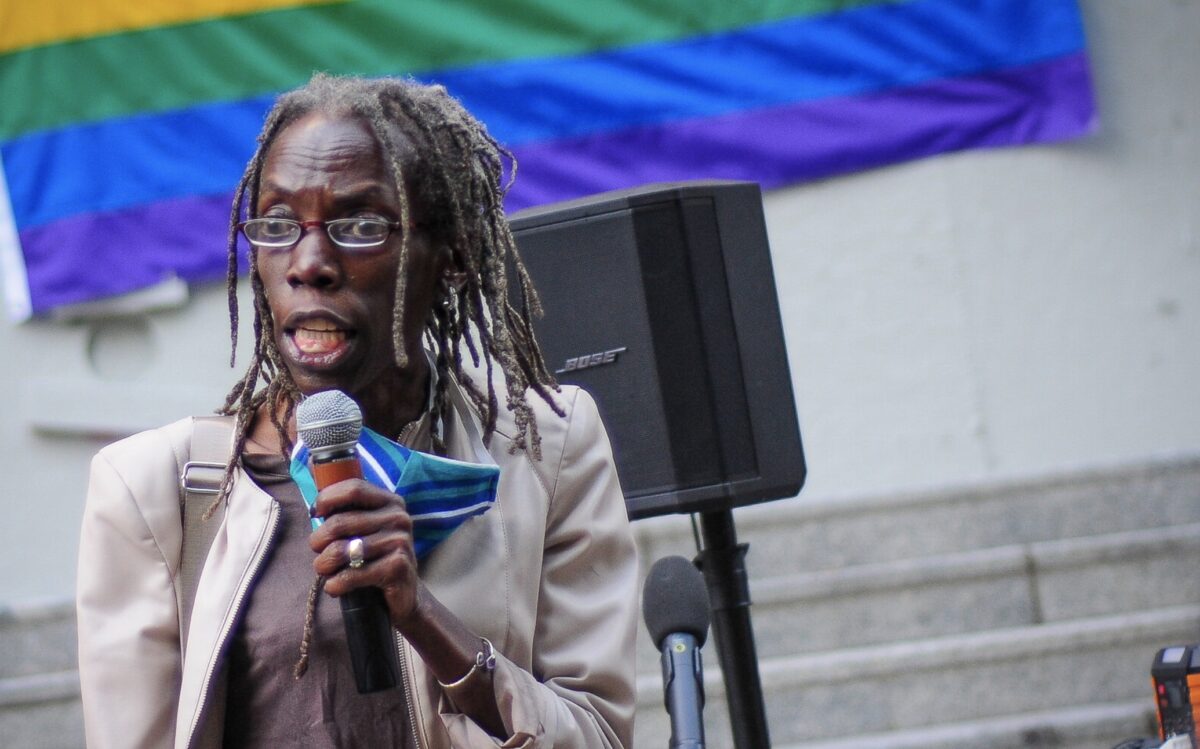
(Photos: Jonathan Maus/BikePortland)
Two days before Christmas Portland Mayor Ted Wheeler played City Council Santa by handing out new bureau assignments. The recipient of the Portland Bureau of Transportation was Commissioner Jo Ann Hardesty.
“When we look at these issues through a public health lens, we see that traffic enforcement does not improve outcomes.”
— Jo Ann Hardesty
The move puts the 63-year-old former state representative, NAACP president, and Portland’s first Black woman city council member in charge of Portland’s streets — and the 900-plus employee agency that manages and maintains them. In addition to our streets, PBOT also manages a bike and e-scooter share system, regulation of ride-hailing firms Uber and Lyft, our Vision Zero plan, and more.
While Hardesty doesn’t come to the job with transportation policy experience, many of her values and leadership experiences line up well with the direction PBOT is headed. Hardesty also takes over from her biggest ally on council, outgoing Commissioner Chloe Eudaly. Like Eudaly, Hardesty is likely to firmly adopt the idea of “transportation justice” which aims to right past wrongs of city policies that have left too many Portlanders – especially people of color and people with disabilities — behind. Hardesty has also been council’s most ardent supporter of police reform and has made her concerns about police traffic enforcement known on several occasions since coming to City Hall in 2018.
Advertisement

(Photo: Biketown/City of Portland)
Following the announcement of bureau assignments last week, PBOT shared a statement on Twitter that said, “[Hardesty’s] dedication to building a more equitable Portland and bringing new voices to city government will help us to accelerate our own commitments to transportation justice and to ensure that our transportation system serves the needs of all our fellow Portlanders.”
Another issue where Hardesty aligns with existing PBOT policy is on transit. PBOT’s Enhanced Transit Corridors plan launched in 2018 and laid the groundwork for the Rose Lane Project, one of Eudaly’s signature accomplishments. In an interview with BikePortland last year, Hardesty said, “I want public transit to be free. Period… If we’re ever going to impact the climate, we need to get people out of automobiles.”
Now Hardesty finds herself in a position to push TriMet in that direction at a time when the transit agency is looking for a new general manager. Hardesty could support demands from the Getting There Together Coalition for a more transparent hiring process.
Advertisement

Hardesty will also find agreement at PBOT and within local transportation activism circles with her desire move away from using armed police officers to enforce traffic laws. This is an issue Eudaly already started working on and something Hardesty could make significant progress on as PBOT Commissioner. As part of her Rethink Portland initiative launched in October, Hardesty hosted a panel about community safety that featured Dr. Jonathan Jay from the Boston University School of Public Health. When I asked Hardesty to explain how her proposal to eliminate $18 million from the Portland Police Bureau budget would impact traffic enforcement, she cited Dr. Jay’s work. “What we know from public health experts such as Dr. Jon Jay from Boston University is when we look at these issues through a public health lens, we see that traffic enforcement does not improve outcomes; technology and infrastructure upgrades do. I am more than happy to look at reinvestments that can be made to infrastructure to build systems that can truly keep Portlanders safe.”
Some of those infrastructure investments could come via Vision Zero. Interestingly, Hardesty voted against Vision Zero when it came to City Council in June 2019. She said PBOT focused too much on individual behaviors when the system itself isn’t a level playing field. “I continue to have the concern that we are over-criminalizing one segment of our community and using them as the reason why people are dying rather than the poor conditions of our roads,” Hardesty said before voting “no” on a two-year update of PBOT’s Vision Zero Plan. “The lack of lighting, the lack of sidewalks in many places. I think it all works together.”
Advertisement
The debate over enforcement is likely to grow louder during Hardesty’s tenure. Another place where Hardesty is likely to amplify an existing PBOT position is on the I-5 Rose Quarter project.
“We believe Hardesty understands who projects are built by and for, where they are built, when they are built, and why they are built are just as important as what projects the City is building.”
— Ashton Simpson, Oregon Walks
Many transportation reform activists in Portland support Eudaly’s opposition to ODOT’s plan to spend an estimated $800 million on more lanes and surface street changes through the Rose Quarter. Hardesty is likely to share that stance. She told No More Freeways in April 2018 that she strongly opposes the project and that, “expanding I-5 should be an absolute last resort to addressing crashes and congestions.” And Hardesty is likely to be very skeptical of ODOT’s second try to replace the I-5 bridge over the Columbia River. In 2013 we covered an anti-Columbia River Crossing project event where she (as board president of Coalition for a Livable Future) said, “We the people get to decide what a livable community looks like, and that ain’t it.”
Hardesty’s past as a community organizer, politician and racial justice activist are being seen as a big plus by local transportation advocates.
Asked to comment on her future as PBOT commissioner last week, newly-named Oregon Walks Executive Director Ashton Simpson told us, “Transportation is not a side issue in America’s struggle for civil rights… Transportation is about economic mobility and we believe Hardesty understands who projects are built by and for, where they are built, when they are built, and why they are built are just as important as what projects the City is building.”
And Street Trust Board President Kimberlee Stafford said, “With traffic violence surging in the midst of the COVID-19 pandemic that has exacerbated inequality, our streets need to be safer for all people who use them. We know from Commissioner Hardesty’s decades of experience that she will help PBOT to embrace a more holistic view of community safety and push the intersections of race, class, and gender into the forefront of just policy making.”
New bureau assignments become effective January 1st, 2021.
— Jonathan Maus: (503) 706-8804, @jonathan_maus on Twitter and jonathan@bikeportland.org
— Get our headlines delivered to your inbox.
— Support this independent community media outlet with a one-time contribution or monthly subscription.


